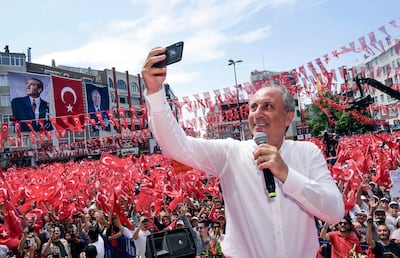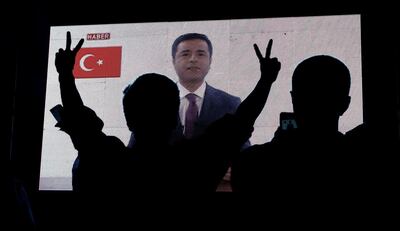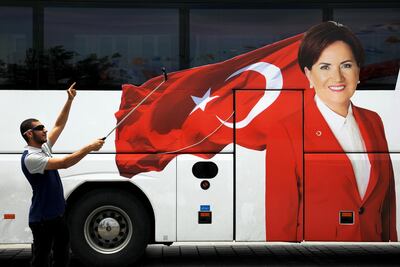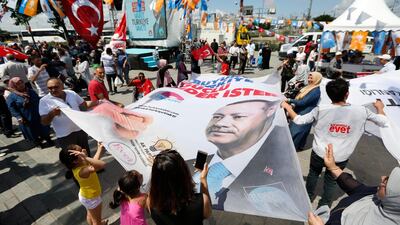President Recep Tayyip Erdogan of Turkey calls elections for a reason. In 2015, he ordered a second vote in just months, after the electorate denied his ruling Justice and Development party (AKP) a parliamentary majority. This time, he wants to take it all.
Sunday's presidential and parliamentary elections could put the Turkish leader within touching distance of the one-man rule he has long sought. Now 64, Mr Erdogan has emerged stronger from a failed military coup two years ago, yet the country remains under a state of emergency.
After a narrow referendum victory last year to install a presidential system that resembles Vladimir Putin’s Russia, a double win for Mr Erdogan in these elections – arguably the most important in Turkey’s modern history – would consolidate his power, uniting his dominance over the legislature, judiciary and executive.
It was for that reason that in April he called an early vote.
But this time, he faces one of the greatest challenges in his 15-year-long rule and victory is not a foregone conclusion. He faces a rejuvenated opposition with momentum behind a former physics teacher and a Kurdish leader emboldened behind bars.
_____________
Read more of our coverage on Turkey's elections:
Everything you need to know about the Turkish elections
Erdogan election rival courts Turkey’s Kurdish vote
From prison cell, Erdogan rival questions election legitimacy
Erdogan's election travels expose challenge at home
_____________

Polls point to a close-run vote that could see Mr Erdogan face a second-round runoff against the secularist Republican People’s party (CHP) leader Muharrem Ince, if he fails to secure more than half of the presidential vote. He also risks losing the parliamentary majority he gained in the second election of 2015.
Mr Ince is polling at around 30 per cent in the presidential race, and he appears to be attracting voters from outside the party's traditional base. He is promising to reform ties with the West and to bridge the gap with Turkey's Kurdish population.
To that end, he recently paid a visit to Peoples’ Democratic Party presidential candidate Selahattin Demirtas, who is campaigning from his jail cell, where he has been held on terrorism charges since November 2016. Ankara accuses him of links to the outlawed Kurdistan Workers' Party (PKK), the group that has waged a decades-long insurgency against the Turkish state.

Also standing is Meral Aksener, a former interior minister who founded her own Iyi (Good) Party, bidding to become Turkey's first female president. She broke away from former nationalist allies who embraced Mr Erdogan, and has pledged to fight pay inequality, raise salaries of some public employees, and address corruption.
Mr Erdogan has been largely unchallenged for more than a decade by an almost lifeless opposition, but Mr Ince poses a different and dangerous proposition to the ruling elite.
The sitting president has been forced to follow the opposition figure's lead on the campaign trail, pushed into denying Mr Ince’s accusations of meeting with Fethullah Gulen, the accused architect of the July 2016 coup, and matching a CHP pledge to lift the state of emergency.
Mr Ince's outreach to the Kurds, who make up a fifth of the population, could boost his support and take votes away from Mr Erdogan. And if Mr Demirtas' party surpasses the 10 per cent threshold to enter parliament, it could co-ordinate with other opposition parties to deny the president his parliamentary majority.

Turkey's troubled economy has also thrown Mr Erdogan’s superiority into doubt.
The Lira hit a record low in May and more than half of voters, according to the Centre for American Progress, believe that the economy has been handled poorly by the president and his government. Forty-three per cent say their living standards have dropped in the past year compared to the 27 per cent who say they have improved.
Another scenario is that Mr Erdogan retains the presidency but only secures a parliamentary minority or, worse for him, an opposition coalition wins parliamentary control. Such a result would damage the ability of the president’s allies to pass legislation. Anything but a win-win for him in both votes will be viewed as a failure on his part after calling the snap vote.
_____________
Read more of our coverage on Turkey's elections:
Turkey's youth: the last hope for democracy?
Simmering resentment in south-eastern Turkey threatens Erdogan's presidential plans
Under Recep Tayyip Erdogan the Turkish nation is heading toward 'bankruptcy', says opponent
_____________
His calculated campaign to achieve a one-man system – doing away with the office of prime minister – is expected to be met with more resistance, with a portion of the opposition and the Turkish electorate hoping to halt him in his tracks. Analysts point to major doubts among Turks about the direction that their country is heading.
"Turks remain deeply divided and uncertain about the political leadership of Turkey, the state of the national economy, and the country’s posture and position vis-a-vis the West and Russia," said analysts at the Centre for American Progress.

But Mr Erdogan, as Turkey’s most popular politician, undoubtedly remains the favourite to secure victory on Sunday. He has added power after the military coup, purging state institutions, arresting some 55,000 people, targeting opposition media outlets and playing to his dedicated core supporter base.
If there are any doubts about Mr Erdogan's electoral gamble he is not showing it. Rather, he is conveying that he could be the man to deliver the knock-out punch to the country’s opposition and be the president encompassed in his election poster slogan: "A great Turkey needs a strong leader."
At a recent election rally Mr Erdogan shouted: “Are we ready to give them such an Ottoman slap on June 24?” in reference to a disorientating open-palmed strike. “We will work hard for this. No sitting back, no stopping.”

